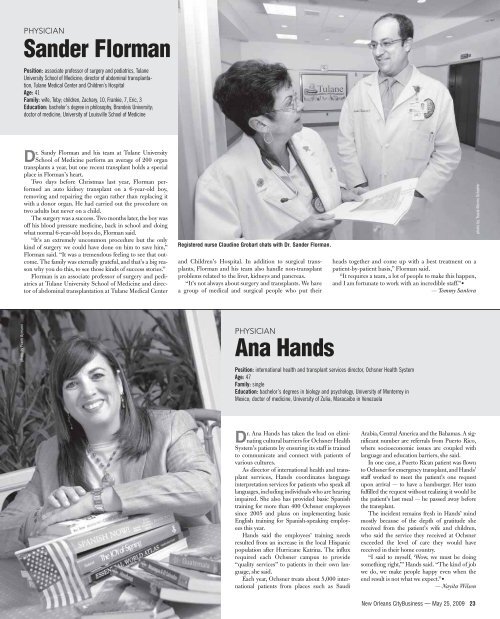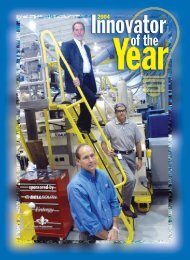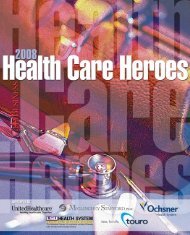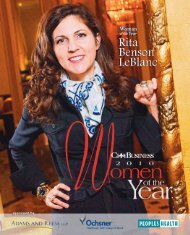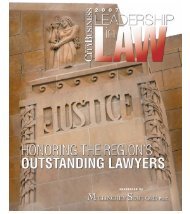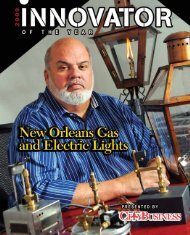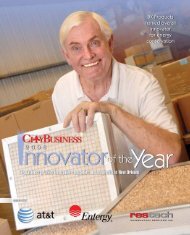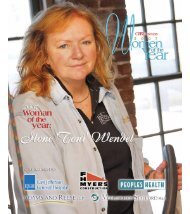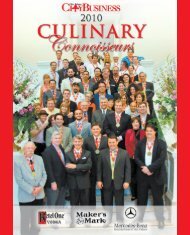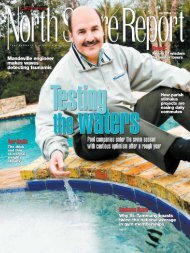PHYSICIANSFrank DellaCrocePosition: co-founder, Center for Restorative Breast SurgeryAge: 42Family: wife, Janet; children, Hannah, 13, Nicolas, 10, Holley, 7Education: bachelor’s degree in pre-medicine, Northeast Louisiana University;doctor of medicine, Louisiana State University Health Sciences Centerphoto by Tracie Morris SchaeferScott SullivanPosition: co-founder, Center for Restorative Breast SurgeryAge: 44Family: wife, Michele Cooper; daughters, Alexis, 9, Elle, 5Education: bachelor’s degree in biomedical engineering, Tulane University;doctor of medicine, Louisiana State University Health Sciences CenterFrank DellaCroce, left,and Scott Sullivan.Drs. Frank DellaCroce and Scott Sullivan bring an individualappreciation for the aesthetic to their joint practiceat the Center for Restorative Breast Surgery.Sullivan’s distaste for the staid appearance of traditionaldoctors offices blends with DellaCroce’s appreciation ofwomen’s maternal qualities and natural anatomy, leading to aspa-like setting where patients enjoy aesthetically pleasingresults.“I still can’t stand going into a doctor’s office and it’s likea bus station. It’s so impersonal, sitting on chairs and everyonestaring at each other,” said Sullivan, <strong>who</strong> as a child battlingrecurring bronchitis dreaded physicians in white coatsand hospitals that smelled of rubbing alcohol.“I appreciate the artistry that is a woman’s body,”DellaCroce said. “To see that lost, harmed or hurt throughsurgical treatment, for me, is tragic.”The two bring years of innovation and experience to theirjoint practice dedicated to reconstructing the breasts ofwomen facing mastectomies in fighting cancer.They are noted for the sensitivity they display in preservingthe female form in the nipple-sparing mastectomy procedurethey pioneered, avoiding implants by using fat from thepatient’s body and leaving as little scarring as possible.Sullivan said they replace breast tissue with similar tissuefrom such parts of the body as the stomach, preserving a lifelikeresult and also considering the appearance of the sitefrom which tissue is taken.“It’s changing their life, retaining their femininity,” Sullivansaid. “What they are most afraid of is being deformed.”More than half their patients are from outside Louisianaand the United States.“It’s almost to the point that patients don’t want to leavethe doctor’s office,” Sullivan said. “<strong>We</strong>’ve had patients <strong>who</strong>,after going to the hotel (after recovery) decided to spend theday at the hospital.”•— Diana ChandlerPHYSICIANJoseph EppsPosition: neurosurgeon, Slidell Memorial HospitalAge: 67Family: wife, Shirley; daughters, Nikki, 34, Kelly, 30Education: bachelor’s degree in zoology, Howard University; doctor ofmedicine, Howard University College of MedicineFor Dr. Joseph Epps, a neurosurgeon at SlidellMemorial Hospital, medicine is a family tradition. Hisfather, Joseph, was a general surgeon, and his mother, Sara,was a social worker. While he became a doctor of medicine,his sister, Grace, earned her doctorate in medicaleducation.“My entire family was involved in the medical field,” saidEpps, <strong>who</strong> is the only neurosurgeon practicing full-time andtaking calls in Slidell Memorial Hospital’s emergency room.“I knew of nothing else.”Epps and his wife, Shirley, a registered nurse, maintain apractice in Slidell. Their daughter, Nikki, is an instructor ofanatomy and physiology at Colorado Technical University,while daughter Kelly will participate in a cardiology fellowshipat the University of Pennsylvania that starts in June.A native of <strong>New</strong> <strong>Orleans</strong>, Epps graduated from HowardUniversity in Washington, D.C., where he stayed for medicalschool, a residency in general surgery and a neurologyfellowship.When he returned to <strong>New</strong> <strong>Orleans</strong>, he set up his practice ineastern <strong>New</strong> <strong>Orleans</strong> and became the city’s first African-American neurosurgeon. Epps also was one of the first 10African-American neurosurgeons trained in the country.Throughout his career, Epps said his greatest accomplishmenthas been surviving and recovering from the aftermathof Hurricane Katrina, during which he lost his houseand practice. Through it all, though, Epps used his selfinventedelectronic medical record system that allowed himto forward displaced patients’ records to physicians throughoutthe country.Until the storm, he also acted as a clinical professor ofneurosurgery at Tulane University for nearly 30 years wherehe taught 20 residents about neurosurgery. Teaching othersabout medicine, he said, has been one of the most rewardingaspects of his career.“The interchange and education of <strong>those</strong> residents iswhat I feel most strongly about.”•— Amy Ferrara Smithphoto by Tracie Morris Schaefer22 Health Care Heroes
PHYSICIANSander FlormanPosition: associate professor of surgery and pediatrics, TulaneUniversity School of Medicine; director of abdominal transplantation,Tulane Medical Center and Children’s HospitalAge: 41Family: wife, Toby; children, Zachary, 10, Frankie, 7, Eric, 3Education: bachelor’s degree in philosophy, Brandeis University;doctor of medicine, University of Louisville School of MedicineDr. Sandy Florman and his team at Tulane UniversitySchool of Medicine perform an average of 200 organtransplants a year, but one recent transplant holds a specialplace in Florman’s heart.Two days before Christmas last year, Florman performedan auto kidney transplant on a 6-year-old boy,removing and repairing the organ rather than replacing itwith a donor organ. He had carried out the procedure ontwo adults but never on a child.The surgery was a success. Two months later, the boy wasoff his blood pressure medicine, back in school and doingwhat normal 6-year-old boys do, Florman said.“It’s an extremely uncommon procedure but the onlykind of surgery we could have done on him to save him,”Florman said. “It was a tremendous feeling to see that outcome.The family was eternally grateful, and that’s a big reasonwhy you do this, to see <strong>those</strong> kinds of success stories.”Florman is an associate professor of surgery and pediatricsat Tulane University School of Medicine and directorof abdominal transplantation at Tulane Medical CenterRegistered nurse Claudine Grobart chats with Dr. Sander Florman.and Children’s Hospital. In addition to surgical transplants,Florman and his team also handle non-transplantproblems related to the liver, kidneys and pancreas.“It’s not always about surgery and transplants. <strong>We</strong> havea group of medical and surgical people <strong>who</strong> put theirheads together and come up with a best treatment on apatient-by-patient basis,” Florman said.“It requires a team, a lot of people to make this happen,and I am fortunate to work with an incredible staff.”•— Tommy Santoraphoto by Tracie Morris Schaeferphoto by Frank AymamiPHYSICIANAna HandsPosition: international health and transplant services director, Ochsner Health SystemAge: 47Family: singleEducation: bachelor’s degrees in biology and psychology, University of Monterrey inMexico; doctor of medicine, University of Zulia, Maracaibo in VenezuelaDr. Ana Hands has taken the lead on eliminatingcultural barriers for Ochsner HealthSystem’s patients by ensuring its staff is trainedto communicate and connect with patients ofvarious cultures.As director of international health and transplantservices, Hands coordinates languageinterpretation services for patients <strong>who</strong> speak alllanguages, including individuals <strong>who</strong> are hearingimpaired. She also has provided basic Spanishtraining for more than 400 Ochsner employeessince 2005 and plans on implementing basicEnglish training for Spanish-speaking employeesthis year.Hands said the employees’ training needsresulted from an increase in the local Hispanicpopulation after Hurricane Katrina. The influxrequired each Ochsner campus to provide“quality services” to patients in their own language,she said.Each year, Ochsner treats about 5,000 internationalpatients from places such as SaudiArabia, Central America and the Bahamas. A significantnumber are referrals from Puerto Rico,where socioeconomic issues are coupled withlanguage and education barriers, she said.In one case, a Puerto Rican patient was flownto Ochsner for emergency transplant, and Hands’staff worked to meet the patient’s one requestupon arrival — to have a hamburger. Her teamfulfilled the request without realizing it would bethe patient’s last meal — he passed away beforethe transplant.The incident remains fresh in Hands’ mindmostly because of the depth of gratitude shereceived from the patient’s wife and children,<strong>who</strong> said the service they received at Ochsnerexceeded the level of care they would havereceived in their home country.“I said to myself, ‘Wow, we must be doingsomething right,’” Hands said. “The kind of jobwe do, we make people happy even when theend result is not what we expect.”•— Nayita Wilson<strong>New</strong> <strong>Orleans</strong> <strong>City</strong><strong>Business</strong> — May 25, 2009 23


